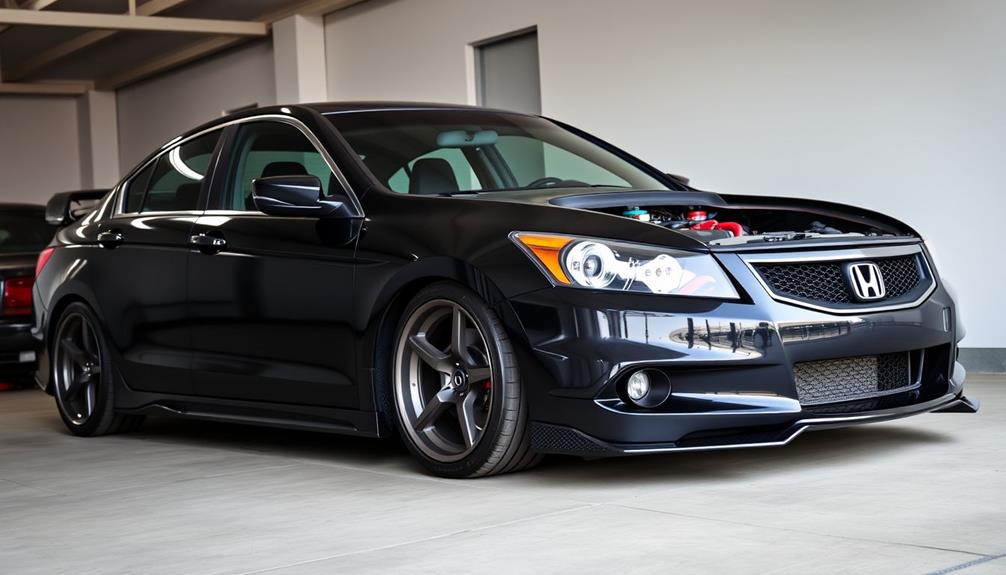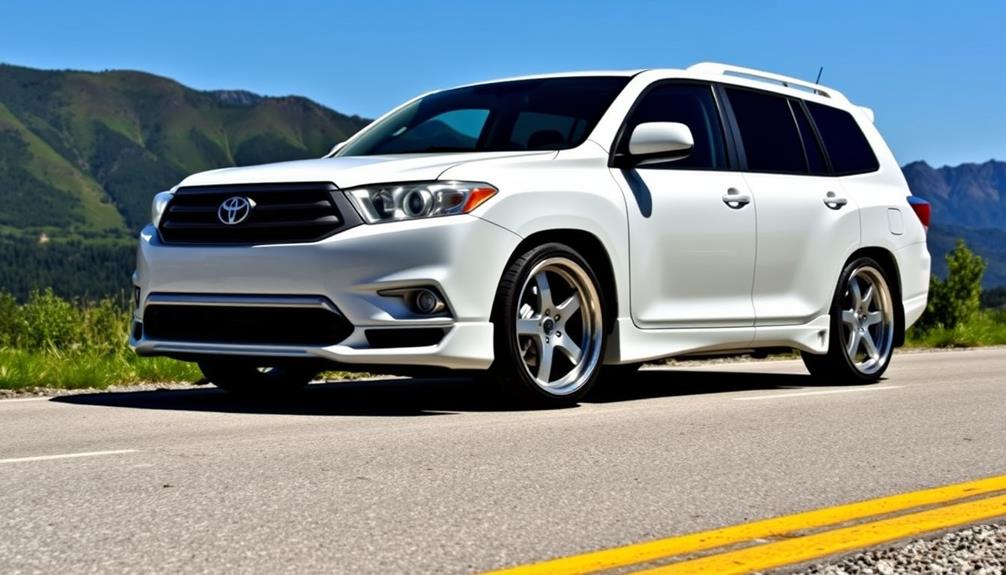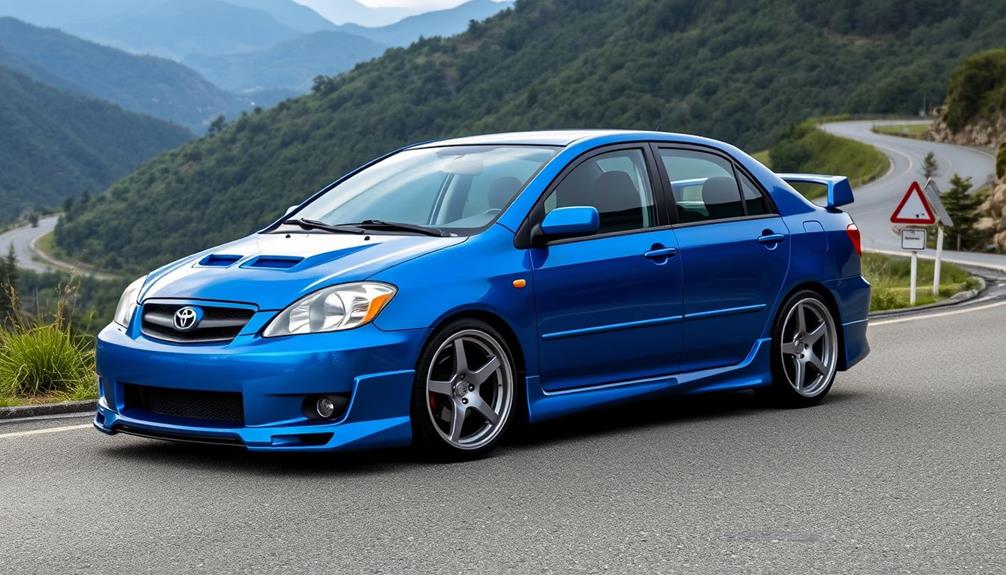Tuning your Toyota C-HR can markedly enhance your driving experience. Start with modest power upgrades like intake and exhaust modifications, which can provide slight gains of 2-5 horsepower. For more serious enthusiasts, consider suspension upgrades like high-quality coilovers that improve handling and ride quality. Weight reduction techniques, such as lightweight wheels, can also boost performance. Don't overlook braking system enhancements, as improving stopping power is essential for overall performance. While the aftermarket options may be limited, setting realistic goals helps you optimize your C-HR. Explore these ideas further, and you'll discover even more ways to maximize your ride.
Key Takeaways
- Focus on weight reduction by investing in lightweight wheels and replacing the stock hood for improved handling and responsiveness.
- Consider coilover suspension systems for enhanced handling, adjustable ride height, and reduced body roll during cornering.
- Upgrade the braking system with larger rotors and performance-oriented pads to improve stopping distances and overall responsiveness.
- Set realistic expectations for horsepower gains; typical aftermarket modifications yield modest increases, and extensive changes can risk reliability.
- Engage with the Toyota C-HR community for insights and experiences on modifications, prioritizing daily driving needs over extreme performance enhancements.
Overview of Toyota C-HR
The Toyota C-HR stands out in the subcompact crossover SUV segment, combining style and practicality. Introduced in 2017, this compact SUV features a front-mounted 2.0L four-cylinder engine that delivers 144 horsepower, making it a solid choice for efficiency-focused drivers.
With a 0-60 mph acceleration time of just 10.8 seconds, it prioritizes fuel economy over sheer speed, appealing to those who value everyday usability. The C-HR's stylish exterior design attracts attention, while the spacious trunk provides practicality for your daily needs.
This model quickly became popular, securing its spot as the fourth best-selling Toyota shortly after its launch, reflecting a strong consumer interest in compact crossovers. Additionally, its compact size and efficient design resonate with the growing trend of minimalistic living, similar to the appeal of tiny homes for those seeking simplicity in their lifestyle.
In the vibrant car culture, the C-HR has gained traction among enthusiasts who appreciate its customization potential. Various trim options and a range of aftermarket modifications are available, allowing you to personalize your ride to fit your style and preferences.
Whether you're looking to enhance aesthetics or performance, the C-HR offers a versatile platform to explore your passion for tuning and customization. Embrace the journey of making your C-HR uniquely yours!
Power Enhancement Options
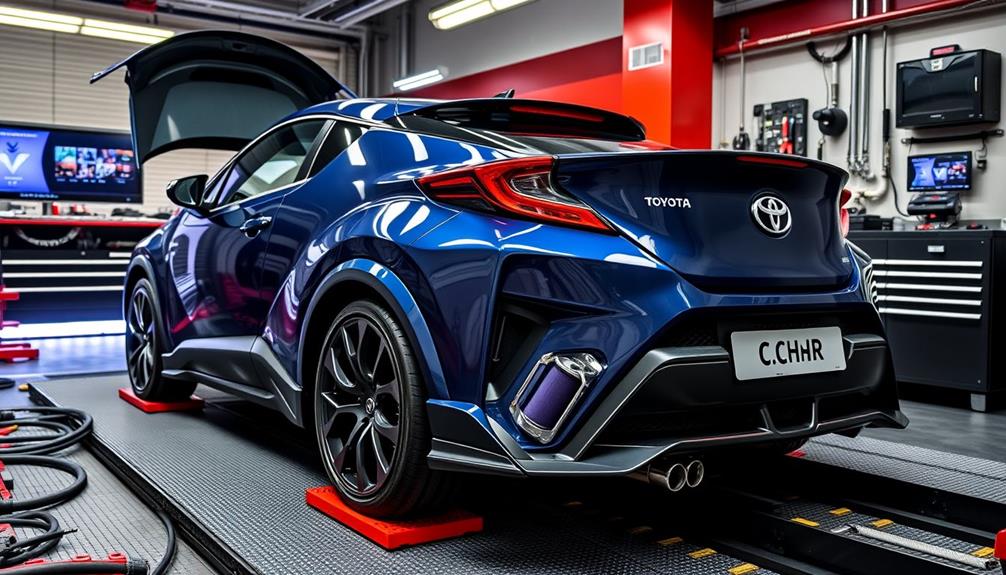
When you're looking to boost your Toyota C-HR's power, it's important to know the limitations you'll face.
Standard modifications like intake and exhaust upgrades offer minimal gains, while turbocharging demands significant engine modifications and careful planning.
You'll also want to reflect on the risks associated with aftermarket mods, as they can impact your car's reliability and performance.
Engine Tuning Limitations
Engine tuning for the Toyota C-HR presents several limitations that can frustrate enthusiasts seeking significant power enhancements. One major issue is the C-HR's continuously variable transmission (CVT), which restricts horsepower increases, making it tough to achieve substantial modifications.
While typical performance upgrades like intake and exhaust modifications are popular, you'll find they usually only provide minimal gains of about 2-5 horsepower.
Custom tuning options for the C-HR's 2.0L naturally aspirated engine are also limited. You might see potential increases of 10-20 horsepower, but these aren't guaranteed and often depend on the specific modifications made. Many owners express frustration over the lack of aftermarket support, as the inherent limitations of the naturally aspirated 4-cylinder engine make significant enhancements a challenge.
If you're aiming for more power, be prepared for extensive modifications, especially if you consider turbocharging. This requires not only internal changes but also enhanced oiling and cooling systems to manage the increased pressures.
Ultimately, understanding these engine tuning limitations will help you set realistic expectations for performance upgrades on your Toyota C-HR.
Turbocharging Considerations
Turbocharging offers a pathway for Toyota C-HR owners looking to boost power beyond the limitations of the naturally aspirated engine. However, you'll need to make significant engine modifications to accommodate this upgrade. Enhancements to internal components, along with improvements to the oiling and cooling systems, are vital to withstand the increased pressures that come with turbocharging.
A custom tune is necessary for integrating a turbo system with your 2.0L engine, and while you might expect a power increase of 10-20 hp, results aren't guaranteed. You should also consider that the CVT transmission limits significant horsepower gains, which might impact your overall performance.
It's important to note that attempting to turbocharge your C-HR can pose risks to engine reliability. The stock 4-cylinder engine isn't designed for extreme power enhancements without the proper support.
Unfortunately, aftermarket support for turbocharging the C-HR is limited, meaning you'll need to carefully plan your modifications to avoid potential mechanical failures. Prioritize thorough research and consult with professionals to guarantee your turbocharging project is successful and doesn't compromise your vehicle's integrity.
Aftermarket Modifications Risks
Aftermarket modifications can be tempting for C-HR owners keen to enhance their vehicle's performance, but they come with inherent risks that shouldn't be overlooked.
While you might dream of significant horsepower increases, the limitations of the CVT transmission and the naturally aspirated 4-cylinder engine restrict the potential gains. Typical power modifications, like intake or exhaust upgrades, usually only yield a modest 2-5 hp.
Custom tuning for the 2.0L engine is scarce, offering uncertain gains of 10-20 hp, but these improvements can jeopardize engine reliability. Turbocharging your C-HR might sound appealing, yet it necessitates extensive modifications, including upgrades to internal components, oiling, and cooling systems to handle the increased pressure.
Many C-HR owners find themselves frustrated by the lack of aftermarket support and are often disappointed when attempts to boost power lead to reliability issues.
To avoid costly repairs, it's vital to set realistic expectations for performance upgrades. In short, while aftermarket modifications can be an exciting avenue for enhancement, weighing the risks against the potential rewards is essential for maintaining your C-HR's longevity.
Suspension Modifications and Upgrades
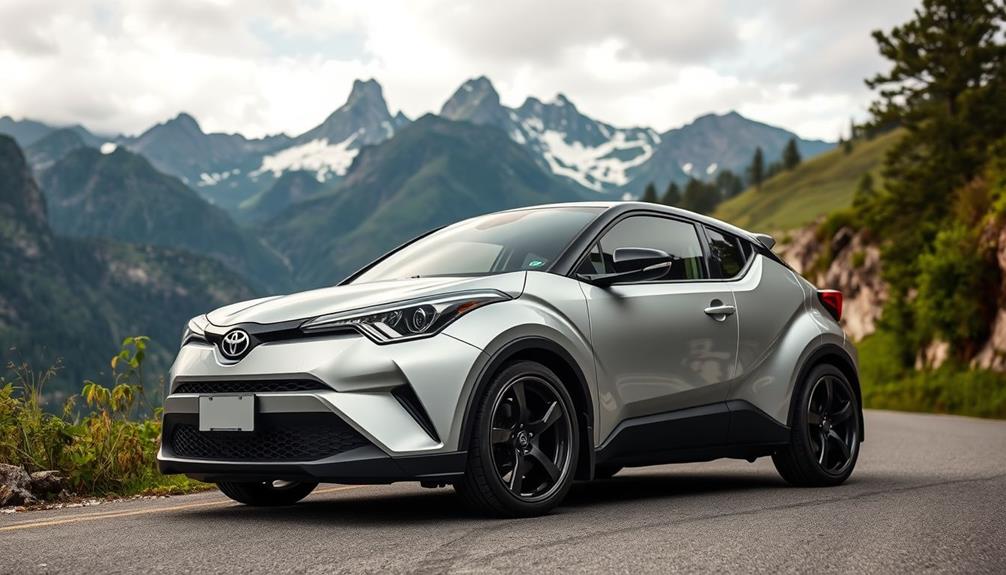
When it comes to suspension modifications for your Toyota C-HR, upgrading to coilovers can greatly enhance your handling and ride quality.
If you prefer more versatility, air suspension options like the Airtech Pro Plus allow you to adjust ride height on the fly.
Both upgrades can markedly improve your driving experience and overall vehicle performance.
Coilover Suspension Benefits
Coilover suspension systems offer a significant upgrade for your Toyota C-HR, providing adjustable ride height and spring rates that allow you to fine-tune your vehicle's handling.
This customization not only improves handling but also enhances your daily driving experience. With the ability to lower your C-HR, you can reduce body roll during cornering, resulting in a more stable and controlled ride, especially when you're pushing the limits.
The use of monotube dampers in coilover systems guarantees better heat dissipation and responsiveness compared to traditional twin-tube designs, which means you'll feel the difference in handling dynamics right away.
Whether you're maneuvering tight turns or cruising on the highway, a coilover suspension can make your C-HR feel sportier and more agile.
Investing in high-quality coilovers from reputable brands like Ksport assures durability and performance.
This guarantees that your upgrade isn't only effective for spirited driving but also suitable for daily use.
Air Suspension Options
Elevating your driving experience with air suspension options can transform the way your Toyota C-HR handles the road. With air suspension, you'll enjoy improved ride quality and performance, making your crossover feel sportier and more responsive.
One popular choice is the Airtech Air Suspension Kit, priced at $2,314.15, which includes durable front and rear air struts designed for daily driving.
If you're looking for advanced features, the Airtech Executive Air Suspension Kit offers four height sensors for automatic load leveling, ensuring a consistent ride height under varying loads for $5,005.03.
For the ultimate in performance, consider the Airtech Pro Plus Air Suspension, which provides 4-wheel independent ride height adjustment and an OLED remote control for precise adjustments, available for $4,574.49.
These air suspension upgrades give you unmatched height adjustability, making your C-HR versatile enough for both street and show applications.
Whether you want to enhance daily driving comfort or improve handling characteristics, air suspension options are a fantastic way to elevate your C-HR's performance and ride quality.
Weight Reduction Techniques
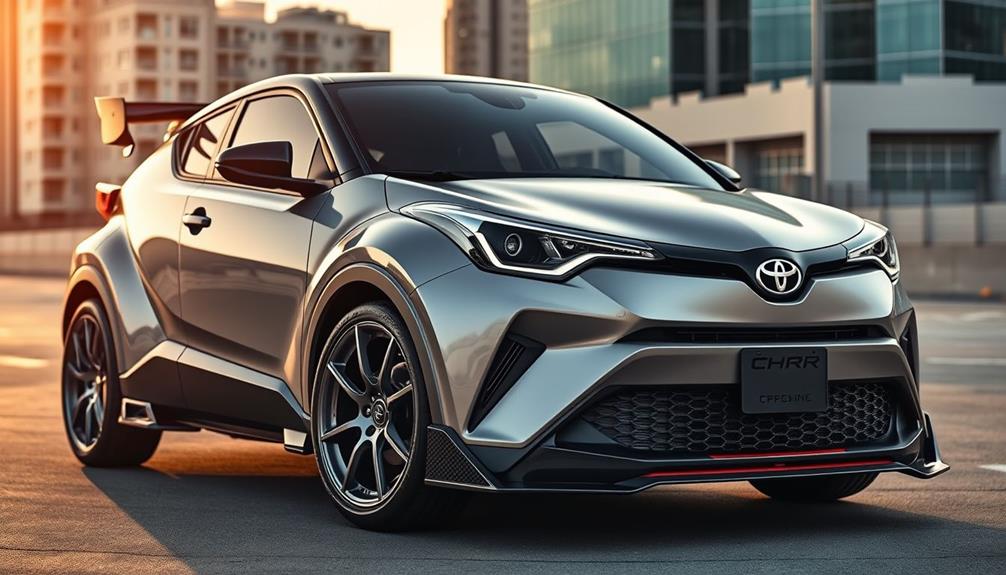
Reducing weight is a game changer for your Toyota C-HR, as it greatly enhances handling and acceleration. One effective method is to invest in lightweight wheels. They reduce rotational mass, improving overall responsiveness and providing a noticeable boost in handling.
Additionally, consider replacing the stock hood with a fiberglass option. This simple swap contributes to weight reduction, making your C-HR feel more agile on the road.
You should also look into removing unnecessary components, like rear seat parts or the spare tire. By shedding this excess weight, you enhance your power-to-weight ratio, which can considerably improve acceleration and handling.
Remember, performance modifications aimed at weight reduction often yield better results regarding driving dynamics than engine upgrades, especially given the limitations of the 2.0L engine.
A thorough approach to weight reduction is key. Utilize lighter materials and choose aftermarket parts designed for this purpose.
Braking System Enhancements
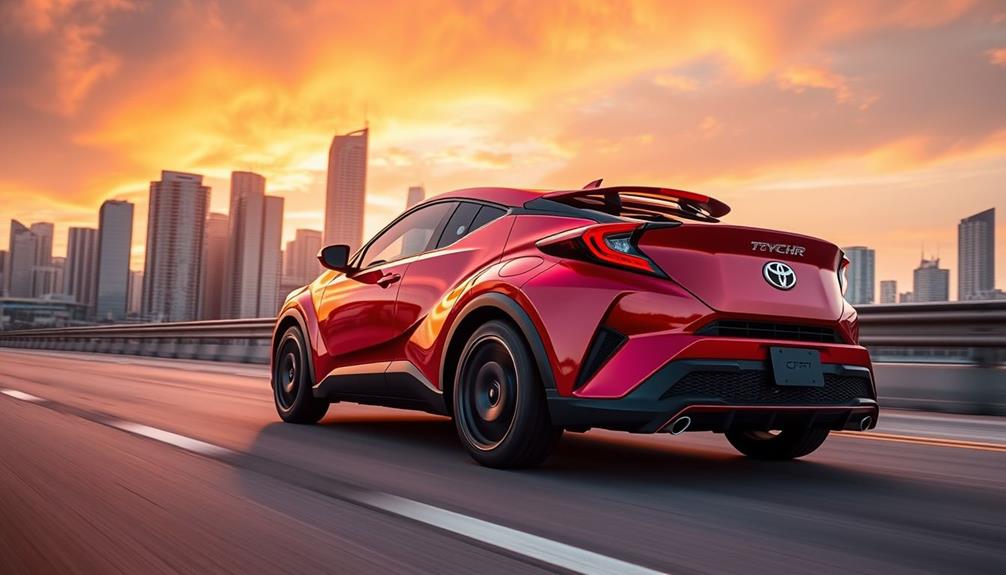
Upgrading your Toyota C-HR's braking system is imperative for enhancing both safety and performance. If you're diving into performance builds, consider a big brake kit. This upgrade increases caliper size and pad surface area, greatly reducing stopping distances, which is essential for spirited driving.
Regular assessment and maintenance of your brake components are crucial, especially when your modifications boost speed and handling. Enhanced systems featuring larger rotors and multi-piston calipers improve heat dissipation, effectively combating brake fade during intense driving sessions or track use.
Don't overlook the importance of performance-oriented brake pads. They offer better grip and responsiveness, contributing to an overall improved braking experience in your modified C-HR.
When you enhance your braking system, make certain to implement these upgrades alongside suspension and engine modifications. This balance guarantees peak performance across acceleration, cornering, and stopping, giving you confidence behind the wheel.
Market Trends and Comparisons
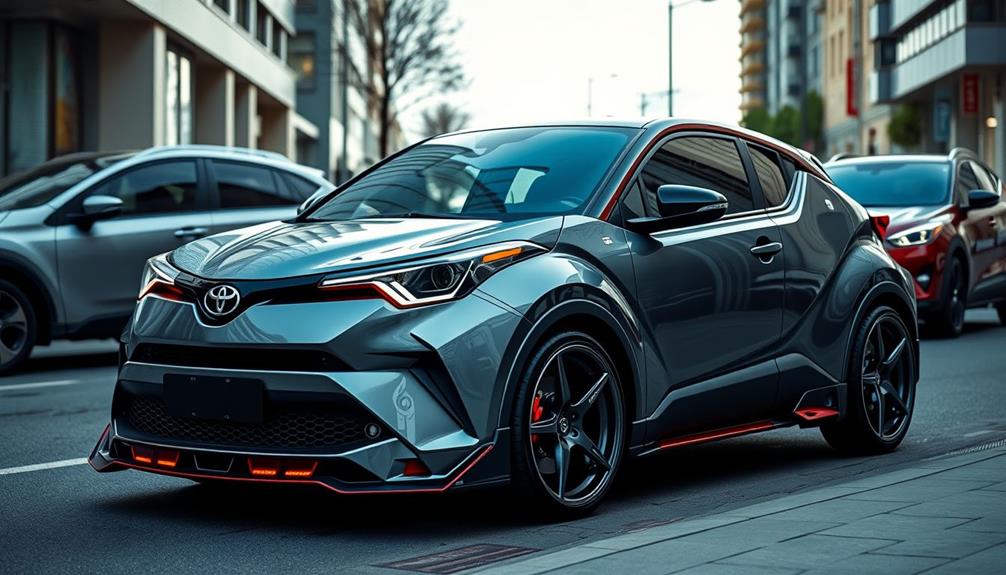
As you enhance your Toyota C-HR's braking system, it's important to contemplate how market trends are shaping the landscape of performance and modifications. In the current market today, many consumers are gravitating towards crossovers that deliver improved power. This shift is evident with the introduction of models like the Corolla Cross, which boasts better performance options compared to the C-HR.
Despite the C-HR's rising popularity and rapid sales growth, many owners express frustration over the limited aftermarket support available for substantial performance upgrades. Instead, there's a noticeable trend towards aesthetic modifications, influenced by tuning culture, particularly from brands like Kuhl Racing in Japan.
Here's a quick comparison of performance options and aftermarket support for the C-HR:
| Feature | Toyota C-HR |
|---|---|
| Performance Options | Limited compared to European models |
| Aftermarket Support | Minimal, focused on aesthetics |
| Market Demand | Growing for compact crossovers |
| Tuning Culture | Aesthetic-focused in Japan |
As you tune your C-HR, staying informed about these trends can help you make better choices for your vehicle.
User Experiences and Community Insights

The Toyota C-HR community is vibrant and filled with passionate owners enthusiastic to share their experiences. Many users express frustration with the limited aftermarket support available, often prioritizing daily driving needs over speed enhancements.
If you're shifting from a high-performance vehicle, you might find the C-HR's power somewhat disappointing. You may end up focusing more on aesthetic upgrades rather than performance modifications.
The Toyota C-HR Forum has become an essential resource for owners like you, offering insights on performance, maintenance, and towing capacity. It can help you navigate modifications effectively, especially if you're new to tuning.
Members emphasize the importance of having realistic expectations, often seeking substantiated performance claims—like dyno charts—before committing to any changes.
Consumer sentiment shows a growing interest in robust engine options, reflecting the desire for more performance modifications among C-HR owners despite the vehicle's inherent power limitations.
Engaging with fellow enthusiasts can provide you with valuable user experiences that guide your tuning journey. By tapping into community insights, you can enhance your C-HR in ways that align with both your performance goals and daily driving needs.
Frequently Asked Questions
Can You Modify a Toyota C-Hr?
Yes, you can modify a Toyota C-HR, but options are limited. Small horsepower gains from intake and exhaust upgrades, along with suspension modifications, can enhance performance. Lightweight components also help improve responsiveness and driving dynamics.
What Is the Common Problem of Toyota C-Hr?
You'll often find yourself frustrated with the Toyota C-HR's underwhelming power and soft suspension. It's like driving a sleek sports car that forgot its engine. Many owners echo your concerns about limited performance upgrades and CVT constraints.
What Does Sport Mode Do on Toyota C-Hr?
Sport Mode enhances your driving experience by boosting throttle response and adjusting the CVT for quicker acceleration. You'll feel improved steering and handling, though be mindful it may increase fuel consumption slightly. Enjoy the ride!
What Is the Fastest Toyota C-Hr?
Fastest C-HR? It's the R-Tuned model. With a turbocharged 2.4L engine and 600 hp, you'll zoom from 0-60 mph in just 2.9 seconds. Its performance's simply sensational and supercharged for thrill-seekers like you!
Conclusion
In tuning your Toyota C-HR, you're not just enhancing performance; you're embracing a journey of discovery. You'll feel the thrill of power, the confidence of improved handling, and the pride of a personalized ride. You'll connect with a community that shares your passion, and you'll transform your crossover into a true reflection of your style. So, immerse yourself, explore the possibilities, and enjoy every twist and turn on the road ahead. Your adventure starts now! Transform your Toyota Yaris into a unique expression of your personality and taste. From aftermarket exhaust systems to custom suspension upgrades, the possibilities are endless. Embrace the freedom to create a one-of-a-kind driving experience that truly stands out on the road. So, rev up your engine, take the reins, and transform your Toyota Yaris into the ultimate driving machine. Your journey to customization begins today!

